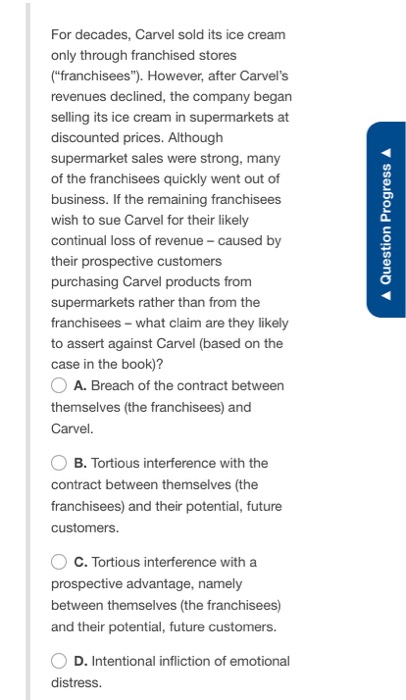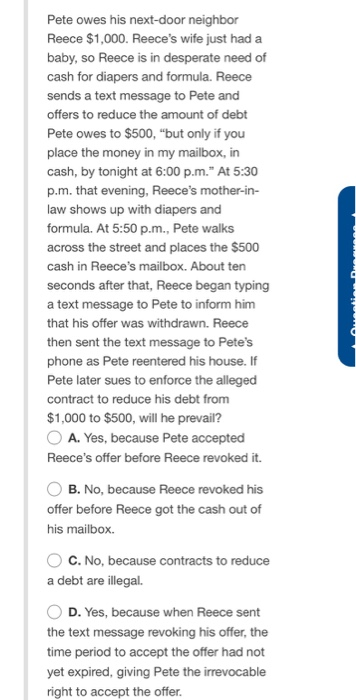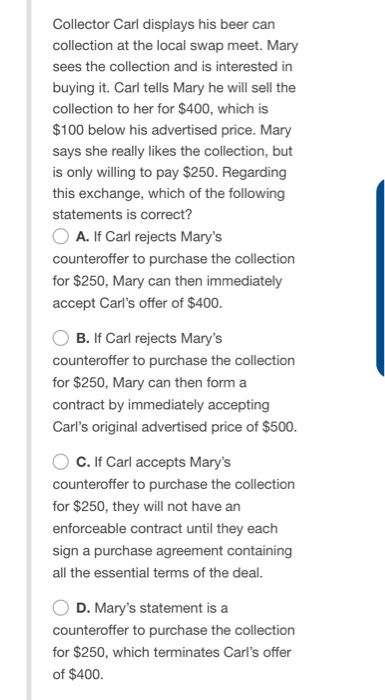For decades, Carvel sold its ice cream only through franchised stores ("franchisees"). However, after Carvel's revenues declined, the company began selling its ice cream in supermarkets at discounted prices. Although supermarket sales were strong, many of the franchisees quickly went out of business. If the remaining franchisees wish to sue Carvel for their likely continual loss of revenue - caused by their prospective customers purchasing Carvel products from supermarkets rather than from the franchisees - what claim are they likely to assert against Carvel (based on the case in the book)? A. Breach of the contract between themselves (the franchisees) and Carvel. A Question Progress A B. Tortious interference with the contract between themselves (the franchisees) and their potential, future customers. C. Tortious interference with a prospective advantage, namely between themselves (the franchisees) and their potential, future customers. D. Intentional infliction of emotional distress. Pete owes his next-door neighbor Reece $1,000. Reece's wife just had a baby, so Reece is in desperate need of cash for diapers and formula. Reece sends a text message to Pete and offers to reduce the amount of debt Pete owes to $500, "but only if you place the money in my mailbox, in cash, by tonight at 6:00 p.m." At 5:30 p.m. that evening, Reece's mother-in- law shows up with diapers and formula. At 5:50 p.m., Pete walks across the street and places the $500 cash in Reece's mailbox. About ten seconds after that, Reece began typing a text message to Pete to inform him that his offer was withdrawn. Reece then sent the text message to Pete's phone as Pete reentered his house. If Pete later sues to enforce the alleged contract to reduce his debt from $1,000 to $500, will he prevail? O A. Yes, because Pete accepted Reece's offer before Reece revoked it. B. No, because Reece revoked his offer before Reece got the cash out of his mailbox C. No, because contracts to reduce a debt are illegal. D. Yes, because when Reece sent the text message revoking his offer, the time period to accept the offer had not yet expired, giving Pete the irrevocable right to accept the offer. Collector Carl displays his beer can collection at the local swap meet. Mary sees the collection and is interested in buying it. Carl tells Mary he will sell the collection to her for $400, which is $100 below his advertised price. Mary says she really likes the collection, but is only willing to pay $250. Regarding this exchange, which of the following statements is correct? O A. If Carl rejects Mary's counteroffer to purchase the collection for $250, Mary can then immediately accept Carl's offer of $400. B. If Carl rejects Mary's counteroffer to purchase the collection for $250, Mary can then form a contract by immediately accepting Carl's original advertised price of $500. C. If Carl accepts Mary's counteroffer to purchase the collection for $250, they will not have an enforceable contract until they each sign a purchase agreement containing all the essential terms of the deal. D. Mary's statement is a counteroffer to purchase the collection for $250, which terminates Carl's offer of $400









